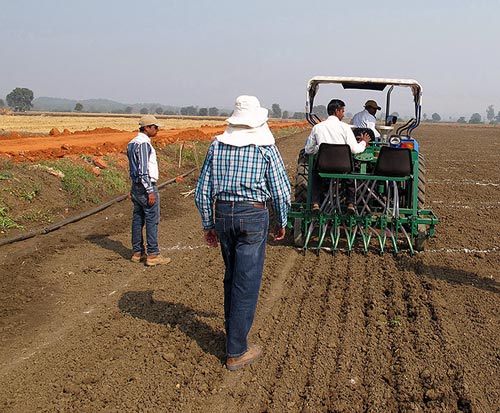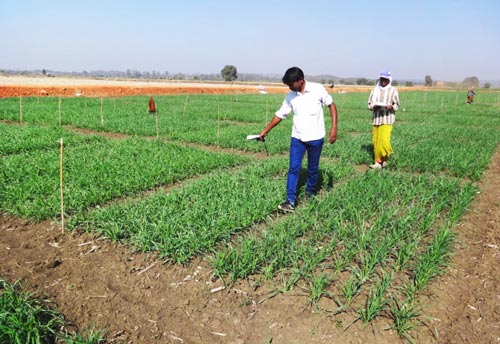By Ravi Valluru, Arun Joshi and Ravi P. Singh/CIMMYT
Innovative approaches to plant genotyping are helping CIMMYT researchers and partners to develop high-yielding, climate-resilient wheat in South Asia.

The genotyping-by-sequencing (GBS) approach offers significant benefits over traditional plant breeding. Conventional breeding relies on scoring phenotypes, which is often laborious and inexact, to determine the estimated breeding value (EBV). This approach delays the verification of breeding results. Plant selection through genome-wide single nucleotide polymorphisms (GS), however, is a variant of marker-assisted selection (MAS) that enables crop breeders to rank best parents accurately and cost-effectively.
Researchers Jesse Poland, a geneticist with Kansas State University, and Ravi P. Singh, head of CIMMYT’s bread wheat improvement program, are developing GBS-assisted wheat with support from Cornell University. The U.S. Agency for International Development (USAID) is funding the $5 million, five-year project under the Feed the Future initiative. “This genotyping project signifies a new era of big science for international wheat development,” Poland said.
The project builds on the established heat tolerance and yield potential framework established by CIMMYT scientists. About 1,000 advanced wheat lines developed in Mexico by CIMMYT were planted at Borlaug Institute for South Asia (BISA) locations as well as in Faisalabad, Pakistan, and six environments in Ciudad Obregón, Mexico, to characterize them for heat tolerance.

Through rigorous testing of wheat lines for various traits – including yield – the GS project will promote the best varietal options for testing and release by national programs and the private sector in South Asia. “Incorporating genomic selection criteria into CIMMYT’s bread wheat breeding pipeline will significantly expedite wheat genetic gains,” Singh said. Wheat varieties developed by the GS project will have enhanced climate resilience. Their heat tolerance and maximized yield potential could reduce heat-induced yield losses by 20 to 30 percent. “Efforts will be initiated to incorporate the genomic selection strategy into conventional breeding programs in South Asia,” said CIMMYT wheat breeder Arun Joshi, adding that genomic information, genomic models and optimized strategies generated through the GS project will benefit cultivar selection worldwide.
Though MAS improves breeding decisions, GS has several additional benefits. “Being a hypothesis-independent approach, the beauty of GS is that it tracks genetic variance for a trait in a population and reduces the breeding cycle significantly,” Singh said. Additionally, the genomic data collected will be useful to manage the genetic diversity and the retention of favorable alleles in the population, safeguarding prospects for long-term genetic gains.
Crucial to implementing the approach are adequate and affordable genotyping platforms, simplified breeding schemes to capture additive genetic effects, models for estimating long-term marker effects and a close collaboration between science and industry.
“If GS-assisted crop breeding, by encompassing other possible biological – for example metabolic – markers, lives up to its promise, it will certainly change the face of crop breeding, productivity and food security,” said CIMMYT wheat physiologist Ravi Valluru, interim coordinator of the GS project at BISA.
 Climate adaptation and mitigation
Climate adaptation and mitigation 

